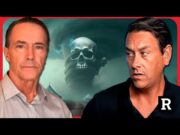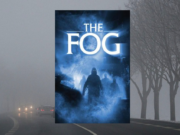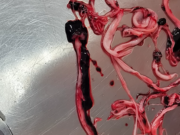 by Mary W Maxwell, PhD, LLB
by Mary W Maxwell, PhD, LLB
When I sit in the Coroners Court in Sydney, I feel grateful that there is such a thing as holding “an inquest into the deaths that occurred in the café.” But I have still not quite grasped what is going on.
So far in this series we have Part 1: Azal’s theory of Monis as a patsy; Part 2: the testimony of a negotiator; Part 3: a whinge about unsatisfactory things such as police’s lack of monitoring equipment; Part 4: a list of Youtube videos pushing a hoax theory; Part 5: the lack of triggers for storming the café. Now let’s get down to more basic legal stuff.
The Job of a Coroner in an Inquest
A coroner is a judge or magistrate who makes a finding into certain kinds of deaths, per the particular state’s legislation — notably, deaths where the body is missing, deaths in custody, and deaths likely caused by homicide. (In some states the coroner also must look at fires and explosions even where there were no deaths.)
In New South Wales, per the Coroners Act 2009, section 84:
“(1) The Supreme Court may, on the application of the Minister or any other person, make any of the following orders if the Court is satisfied that it is necessary or desirable to do so in the interests of justice:
(a) an order that an inquest concerning a death or suspected death be held”
The coroner looks at the death itself, not the many surrounding issues. He can, however, comment on other issues, and he is required to make recommendations that could help protect people against a death in similar circumstances.
For example, a coroner could find that Mary Smith died of asphyxiation from kitchen fumes due to faulty manufacture of a stove hood. His findings could lead to legislation regulating, say, the efficiency of stove hoods.
Note: he would not enter into the matter of how blame should be dealt with. Did this manufacturer deliberately make poor ventilation and thus deserves to be arrested for manslaughter? Did the death violate a contract between merchant and consumer and thus should result in damages being paid to the deceased’s estate?
Such consequences of the coroner’s findings need to be handled by someone other than the coroner. Interestingly, the coroner’s findings cannot be used in any criminal or civil case, as those proceedings have quite different rules of evidence.
Could Judge Michael Barnes Go Further?
I am curious as to whether there is any scope for Judge Michael Barnes, the coroner in the Lindt Café Siege Inquest, to cast his net more widely.
As I have recently published, in Gumshoe’s series on the Royal Commission, the current Royal Commission into Institutional Responses to Child Sexual Abuse has very broad terms of reference and can delve into just about anything. A coroner, however, is not empowered to “delve into just about anything.”
How in fact does he decide what issues to consider? This is partly determined by interested parties. They can apply to the judge to be participants in the Inquest.
The Family of a Deceased Person Has a Role
Normally we expect families to participate. The Johnson and Dawson family are participants in the Lindt siege inquest. Parties can be represented by a lawyer – or represent themselves – at the hearings. This means they can cross-examine witnesses.
Apparently a call was made for written submissions in 2015. Also, the court subpoena’d many documents and videos that shed light on the events of December 15 and 16, 2014. Persons who gave written evidence may then be called to the hearings and are sworn in.
Each of them is entitled (I think) to have a lawyer in the room. The many members of the NSW Police who have given testimony are served by a police lawyer who is at the “front bar table.” He, Dr Ian Freckleton, QC, has been quick to raise objections to certain questions, and the judge makes an immediate decision as to upholding the objection or not.
As an example of the way in which the families are disputing some of the testimony, Ms Gabrielle Bashir, SC, lawyer for the Johnson family, grilled an expert witness. She did not agree with his way of estimating the location of the police shooter by the amount of light that was shown in the window of the café during the shootings.
Is There an Agenda Here?
Undoubtedly the fact that two young people died in the Café — the manager, Tori Johnson, and a customer, Katrina Johnson – is driving the way the whole episode is being looked at. So far I do not perceive the judge, or society, having a plan as to how to grapple with the issues – though this may still emerge.
The Johnson family naturally wants some sort of consideration of the fact that Tori’s death should have been avoided. I suppose this would consist of the police having acted earlier in the day (though we will never know for sure if that would have saved Tori).
Indeed the Johnson family may wish that Prime Minister Tony Abbott had met Monis’s demand for a chat. So far I don’t think this has come up. (Come to think of it, I do not know how to peruse an index of what has occurred so far.)
As for the Dawson family, they may want it to be shown that the 2.13am storming of the café by police should have been done differently. Not that they can bring their dear girl back, but it is understandable that they are fighting what happened. There is no particular person to blame for the way in which bullet fragments travel as that is always an uncontrollable thing.
The court personnel seem to have arranged concepts to be tackled each week or so, such as:
- Did negotiators do a good job?
- Was the police chain-of-command working properly?
- Should the two snipers in the Westpac building have tried shooting Monis through the glass?
- Why was some information not communicated during the siege, such as the demand made by Monis to have the lights tuned out on Martin Place?
Inevitably the wishes of the families are creating an agenda, or at least a backbone to what otherwise may be an amorphous creature – the thousands of pages of documents. So far the agenda centers on the deaths of Tori and Katrina. I have not heard much about the injury of a few other people.
The Absence of the Monis Family
Probably if a member of Man Haron Monis’s family applied to be a participant in this inquest the request would be granted, since Monis also lost his life that day, and not by suicide. His family would thus get the same privileges as the other families, despite Monis being reported to be the murderer of Tori Johnson.
The evidence that he killed Tori Johnson seems to have come from two sources. One is an eyewitness, Selina Win Pe, who swore that she saw Monis shoot Tori in the head at close range.
The other source is forensic evidence (by expert witness Lucas Van der Walt) that the bullet found in Tori’s body did not contain copper. Any of the bullets fired by police did contain copper, so he deduced that the fatal shot did not come from police and therefore came from Monis (who allegedly had a shotgun that fired lead bullets).
To repeat, inquests do not seek to determine an individual’s guilt. That could be done at a trial. Monis can never get a trial as he is dead. I guess Monis’ family could bring a “wrongful death” lawsuit against the police.
To claim that it was wrongful, they would have to allege some reason why the police should not have shot Monis. I suppose the plaintiffs (Monis’s family) could dispute the forensic evidence and the eyewitness evidence as to the killing of Tori. Presumably the NSW state police would be the defendant in such a civil action.
I am not saying this should happen. I am trying to sort out who the players are in an inquest, and how the presence of particular players determines the shape of the investigation.
Disclaimer
I must reiterate that I am only an outside observer, a curious citizen. I have not read any of the written testimony, so please be aware of my ignorance. There is no live-streaming of the court and no publication – yet – of the transcripts. I am told that to buy a day’s worth of transcripts costs about $100.
On my first day I was allowed only into the viewing room (viewing a screen) but on three later occasions was allowed to sit in the courtroom. And on still further three days I – and my 5 peers – had to sit outside quite a bit while the judge cleared the court. Many of the subjects have security implications. For example, a negotiator’s method cannot be entirely revealed.
I would like to pursue the idea of how a coroner could get at, obliquely, any of the broader issues regarding the Lindt Café siege, such as its similarity to other terrorist or gunman events in the world, some of which are widely thought to be “not as stated.” The Paris Bataclan stadium episode and the Orlando gay nightclub shooting come to mind.
How would the matter come up in this courtroom? Clearly the responsibility for such an investigation does not rest with a state coroner. Or does it?
If someone had staged and scripted the Lindt Café siege and pressured Monis into doing what he did, that would be a criminal issue for the police. Any foreign-affairs aspect would be a matter for Parliament.
Still it would be interesting to canvass the ways in which a coroner – a coroner who smelled a rat – might use his or her coronial inquest to examine such a thing.
Please give some thought to how that could be handled. Right now most people would say “Impossible! Unthinkable! No can do!” But lots of things we thought impossible in the past eventually came to be.
— Mary W Maxwell continues her “Let’s think outside the box” coverage of the Lindt Inquest hearings, which you also can attend at 88 Goulburn Street, Sydney, if you first register at 147 Liverpool St at a desk in the right-hand area of the huge foyer.
Photo credit: nhs.uk






























Did I detect somewhere Mary that a boffin in Canberra had a role in tactics/control.
If so who is the boffin and what authority would someone in Canberra have in regard to an event in NSW?
CRIMES (HOSTAGES) ACT 1989 No. 26 of 1989 – SECT 7
Meaning of hostage-taking
7. For the purposes of this Act, a person commits an act of hostage-taking if the person:
(a) seizes or detains another person (in this section called “the
hostage”); and
(b) threatens to kill, to injure, or to continue to detain, the hostage; in order to compel:
(c) a legislative, executive or judicial institution in Australia or in a foreign country;
(d) an international intergovernmental organisation; or
(e) any other person (whether an individual or a body corporate) or group of persons; to do, or abstain from doing, any act as an explicit or implicit condition for the release of the hostage.
Ned, as that is part of an international treaty maybe it does not pertain on land. I can’t research it tonight. However part of Monis’ announcement during the siege was “Australia is under attack” meaning he was the attacker — maybe to invoke the Canberra authority? A man’s got to do what a man’s got to do.
So if there is a boffin with authority, then why do we not hear from Mr. Boffin?
Something to send on to counsel for the victims.
The families are entitled to know who was running the show ….. If anyone?
If you’re going to be like that, Ned, I suppose PJ Allen was entitled to know who was shooting at him while he was doing ditch duty outside Seascape. I wonder if he has dared to ask. Recall he said on the 20th anniversary that he had a lot of anger.
We sure our missing the anger component everywhere these days. Emotion seems verboten at the siege inquest. No wait, I did read that a police chief “broke down in tears.”
Federal Parliament provides this link to state’s terrorism acts:
http://www.aph.gov.au/About_Parliament/Parliamentary_Departments/Parliamentary_Library/Browse_by_Topic/TerrorismLaw
Also, Ned, I see that Qld, NSW and SA have referred powers, as seen in their (identical?) “Terrorism (Commonwealth Powers) Acts” of 2002. But frankly I have not yet located the Boffin Act.
“The position of Scipione and Burn… is that they did not give any orders, directions or provide any guidance or advice in respect of the conduct of the siege on the day,” police barrister Ian Freckelton QC told the inquest, in a bid to prevent them giving evidence. “Frankly, if they did not ‘give any orders’, then what did they do? Why have the title, prestige and salary if you don’t act in such circumstances?”
Ned, I took the above quote from today’s dailytelegraph.com.au as I am in Adelaide till Freitag. It is a long article whose theme is “Police are stupid, let’s use the army instead as they did after Charlie Hebdo in brilliant France.”
But note the comment that Freckleon downplayed the role of NSW chiefs “in a bid to prevent them giving evidence.” Gahd!
Ned, you ask how the Canberra boffin is authorized. That is legal, I believe, “when there is a hostage situation.” I shall try to find the legislation.
But we don’t identify boffins in this court. We also don’t identify negotiators. Hence we had Reg, Pete, and so forth plus Dr Diamond the psychiatrist, all pseudonyms. S’truth.
This is rich for the blood. Professor Michael Chossudovsky at globalresearch.ca says about Paris:
“They were instructed according to their rules of engagement not to intervene, not to come to the rescue of the people inside the Bataclan nightclub or those in the street in front of the Bataclan. 89 people were killed, more than 100 wounded.
“According to a Belgian news report (July 5), The night of the attack at the Paris Bataclan, November 13, 2015, six French military personnel of the Sentinelle Project (launched by France’s Ministry of Defense) were at the entry of the concert hall.
“They did not intervene because the circumstances [pertaining to the Bataclan attacks] did not meet their “rules of engagement”, according to Member of Parliament (Député) Georges Dallemagne.”
Chosso goes on to point out that no French language media picked up the Belgian MP’s report. Meanwhile Paul Craig Roberts has turned out a humdinger at:
http://www.globalresearch.ca/the-nice-terror-attack-towards-a-permanent-state-of-martial-law-in-france-brings-to-mind-operation-gladio/5536338
He says there was no blood noticeable in the latest killings.
No amount of paperwork or ritual can obscure the fact that the event was rooted in civilian disarmament. An apolitical court in a disenfranchised society ? What a joke!
A court is apolitical or it’s not a court. Its legitimcy depends on its loyalty to the law, right? If a judge be loyal to some other entity he/she needs to be writhing in guilt today.
Berry, you may be rigtht that the goal is disarmament. I think the goal is decerebation. This is unbelievably TRAGIC.
Speaking of the cerebral, anyone can attend a conference on “Science, Religion and Art in Islam” at Uni Adelaide from today thru Saturday. It’s in the Braggs theatre which is at northern side (Torrend River side) of the North Terrace campus. Free bus from the airport (and if you’re a senior, stop in at WH Smith shop at airport to get your FREE 14 day metro-bus pass. Read this:
https://ilm-in-islam.org/program/
“NATO can’t stand for terrorism” (or something like that):
http://thehill.com/video/in-the-news/287933-watch-republican-urges-nato-declaration-against-terrorism
Attention Fatso’s and Shorties and Intellectuals:
(from Australian Federal Police recruitment at afp.gov.au)
Q. Do I have to be a minimum height to join?
A. There are no height restrictions. As long as you are fit and healthy, we recruit people of all shapes and sizes.
Q.Does the AFP place an emphasis on physical strength?
A. The key strengths required are intellect and good interpersonal skills. Upper body strength is required in a few instances. Intelligence, good communication and negotiation skills lessen the likelihood of conflict situations developing.